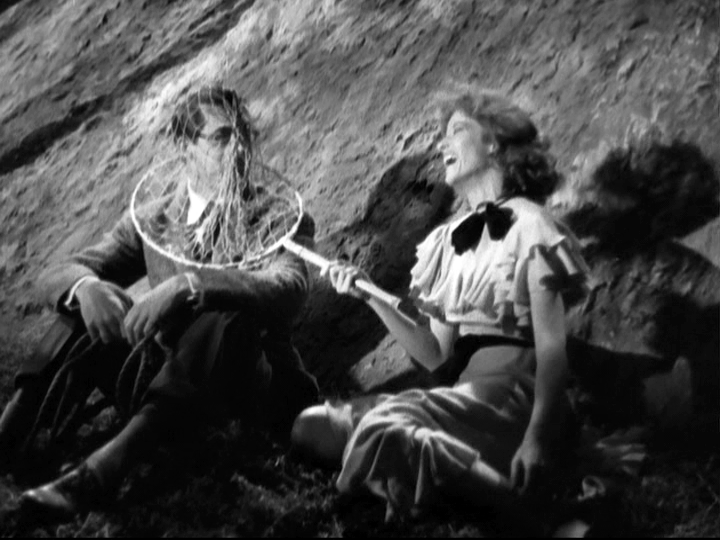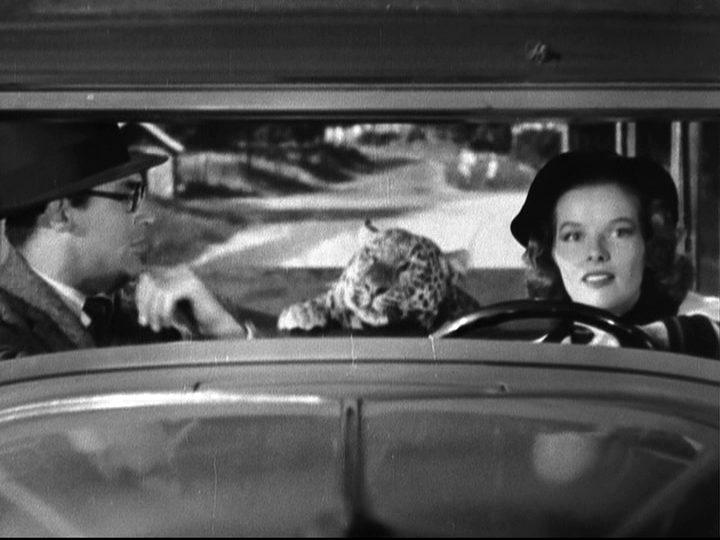Bringing Up Baby, 1938, RKO Radio Pictures. Starring Katharine Hepburn, Cary Grant. Directed by Howard Hawks. B&W, 102 minutes.
Respectable, steadfast scientist Dr. David Huxley (Cary Grant) is engrossed in his latest project, completing the skeletal frame of a brontosaurus. He sets out to convince one Mr. Peabody of the worthiness of his endeavor. Worthy, that is, of a million dollar donation from Peabody’s client, Mrs. Random (May Robson).
He’s rebuffed by Peabody while the two are playing golf, and the outing goes from bad to worse. In the middle of the game he discovers his ball has been appropriated by Susan Vance (Katharine Hepburn), who goes on to drive off in his car. Susan can’t be convinced she’s wrong. The scatterbrained young woman proceeds to lead Huxley on a chase for, among other things, his peace of mind.
Susan has just received a gift from her brother, a leopard with the unlikely name of Baby. She’s oblivious to the outrageous nature of this gift, as she is to much of the chaos that ensues wherever she goes. It turns out the leopard is intended for her aunt, Mrs. Random, the woman Dr. Huxley is hoping will donate to his paleontological project. Susan convinces Huxley to help her transport Baby to her home in Connecticut.

Cary Grant, Katharine Hepburn
Bringing Up Baby did not do well at the time of its release, with critics calling it derivative and predictable. Today, however, it’s considered by many to be one of the top screwball comedies of the era.
Even director Howard Hawks was critical of the film. Years later he said in an interview, “I think the film had a great fault and I learned an awful lot from it. There were no normal people in it. Everyone you met was a screwball.” But he also expressed a fondness for the film in other interviews, saying once, “the most fun you can have is making fun of people…you get a doctor and get laughs out of him, like a psychiatrist, where you drive a psychiatrist crazy like in Bringing Up Baby.” That, it would seem, is a classic element of screwball comedy.
There has been much discussion over Grant’s meaning when, confronted about wearing a woman’s feathered silk robe, Huxley testily responds, “because I just went gay all of a sudden” (leaping in the air on the word “gay”). Many deem that the first time the word was used in a movie in its modern-day sense of “homosexual” rather than “happy.” Etymologists debate how common the term was, including its popularity in Grant’s circles. While the meaning may seem “obvious” to us today, and certainly the amount of innuendo in this film makes that belief laudable, it never was made clear by the director or actors what Grant intended. What does seem certain is the line was ad-libbed, which will forever leave its meaning open to speculation.

Cary Grant, May Robson
The film created a great backlash of ill will for Hepburn, who was labeled “box office poison” after its release and relative failure. That never stopped this phenomenal actress, who two years later turned her luck around with The Philadelphia Story. Playing a ditsy heiress was not her best role. While she did well in later roles playing privileged young women who were somewhat oblivious, it was a little irritating as one who is totally harebrained.
Definitive screwball comedy, Bringing Up Baby is fast-paced, madcap and improbable. It is not Hepburn’s or Hawk’s finest work, but it is fun, and time has proven its worth.

I didn’t know about all the negativity surrounding this film. I thought it was hilarious. But then, I am a tried and true Cary Grant and Kate Hepburn fan.
LikeLiked by 1 person
How do you like the picture of Baby in the post? It took me forever to get just the right shot, and this one makes me laugh every time!
LikeLiked by 1 person
Baby’s expression is a riot. Like one huge Walter or Parker!
LikeLiked by 1 person
Exactly!
LikeLike
I remember the first time I saw this film, I really didn’t think much of it. That was a very long time ago. Now, being older (much older) I enjoy it for the “fun” it gives me. I too wasn’t aware of the negativity surrounding the film. And your “capture” of Baby is perfect! Thank you for another wonderful piece.
LikeLiked by 1 person
I have mixed feelings about it, but overall I think it’s fun, a little wacky. Thank you for the comment about the picture! I think Baby looks almost like a domesticated kitty-cat there, not a wild animal.
LikeLiked by 1 person
[…] paced comedy than many of director Howard Hawks’ earlier works, such as His Girl Friday or Bringing Up Baby, but it works. Hawks said in later interviews he wasn’t interested in “female […]
LikeLike
[…] about the vast possibilities of life.” He mused on the fact that this film, along with Bringing Up Baby, were not as popular at the time of their release as they have become: “As with clothes, […]
LikeLike
[…] was Hawks’ first screwball comedy; he want on the make several more, including Bringing Up Baby and I Was a Male War Bride. He later listed it as one of the top three films he […]
LikeLike